
>BUILDING RESILIENCE TO BIOTHREATS
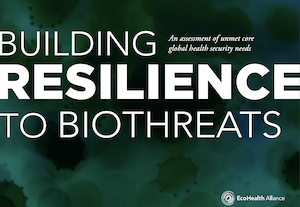
https://www.ecohealthalliance.org/building-resilience
With input from partners at the World Bank Group, EcoHealth Alliance developed Building Resilience to Biothreats as the first end-to-end review of functions necessary for effective prevention through recovery from pandemics. Its intent is to address how well the global community is prepared to defend against biological threats and to identify which global functions need strengthening in order to support a more healthy world. The guidance of several key officials from the government of Liberia were instrumental in its development. For more information on the booklet, please contact communications [at] ecohealthalliance.org. Download Building Resilience to Biothreats.
>NO TIME TO WAIT: SECURING THE FUTURE FROM DRUG-RESISTANT INFECTIONS REPORT TO THE SECRETARY-GENERAL OF THE UNITED NATIONS APRIL 2019.
SUMMARY OF RECOMMENDATIONS AND KEY MESSAGES
https://www.who.int/antimicrobial-resistance/interagency-coordination-group/IACG_final_summary_EN.pdf?ua=1
April 2019. Antimicrobial resistance is a global crisis that threatens a century of progress in health and achievement
of the Sustainable Development Goals. Because the drivers of antimicrobial resistance lie in humans, animals, plants, food and the environment, a sustained One Health response is essential to engage and unite all stakeholders around a shared vision and goals.
There is no time to wait. Unless the world acts urgently, antimicrobial resistance will have disastrous impact within a generation. Stronger political leadership, advocacy, coordination and accountability are needed at all levels to enable a sustained One Health response to antimicrobial resistance. All stakeholder groups – including governments, civil society and the private sector – need to be engaged and to collaborate in an unprecedented effort across the human, animal, plant, food and feed production and environmental sectors, based on a shared vision and goals.
>WASH in HEALTH CARE FACILITIES, Global Baseline Report 2019
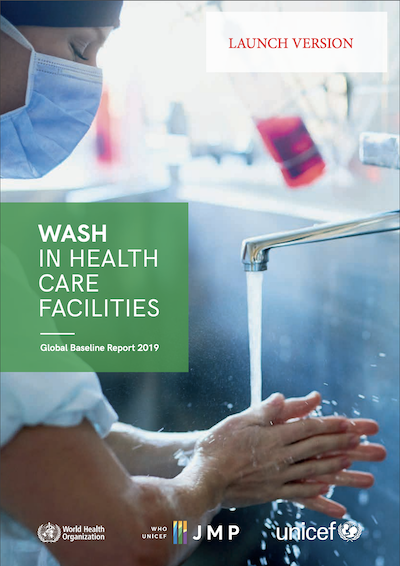
3 April 2019 News release Geneva, New York. This report, WASH in Health Care Facilities, from the WHO/UNICEF Joint Monitoring Programme for Water Supply, Sanitation and Hygiene (JMP), is the first comprehensive global assessment of water, sanitation and hygiene (WASH) in health care facilities. It finds one in four health care facilities around the world lacks basic water services, impacting over 2 billion people, It also finds that one in five health care facilities has no sanitation service*, impacting 1.5 billion people. The report further reveals that many health centres lack basic facilities for hand hygiene and safe segregation and disposal of health care waste.
These services are crucial to preventing infections, reducing the spread of antimicrobial resistance and providing quality care, particularly for safe childbirth. “Water, sanitation and hygiene services in health facilities are the most basic requirements of infection prevention and control, and of quality care. They are fundamental to respecting the dignity and human rights of every person who seeks health care and of health workers themselves,” said António Guterres, United Nations Secretary-General.“I call on people everywhere to support action for WASH in all health care facilities. This is essential to achieve the Sustainable Development Goals.”
>Take over pharma to create new medicines, says top adviser
27 March 2019. By James Gallagher, Health and science correspondent, BBC News
Part of the drugs industry should be taken over to make new antibiotics, an influential economist has argued. Lord O'Neill, who advised the government on antibiotic resistance, said he was shocked by pharmaceutical companies failing to tackle drug-resistant infections and the solution may be to "just take it away from them and take it over".
Bacteria evolving resistance to antibiotics threatens to take medicine back to the dark ages. Some infections could become untreatable and losing the drugs would make surgery and cancer therapy far more risky. It is known as the antibiotic apocalypse.
Read more https://www.bbc.co.uk/news/health-47719269. Global antibiotics 'revolution' needed. Analysis: Antibiotic apocalypse
>UK 5 YEAR AMR STRATEGY AND 20 YEAR VISION

28 January 2019. https://www.gov.uk/government/collections/antimicrobial-resistance-amr-information-and-resources. The UK Government, at the World Economic Forum in Davos, launched its 20-year vision and 5-year national action plan - the new UK strategy for tackling the global threat posed by antimicrobial resistance.
Matt Hancock, the UK Health Secretary, warned that antibiotic resistance “is as big a danger to humanity as climate change or warfare”, and that now is the time to act if we want to mitigate the potential catastrophic impact of AMR.
The government’s plan takes a One-Health approach focussing on three key strategies to implement across human health and the livestock industry, underpinned by several measurable targets for success.
- to reduce the need for antimicrobials by preventing infections, reducing antimicrobial use in humans and animals;
- improving diagnostic support for prescription of antimicrobials.
- encourage the development of new drugs to tackle AMR, where previously research has been neglected due to the limited financial incentives for pharmaceutical companies to invest. To address this, the government have proposed a new model in which they could pay for drugs based on the value they bring to the NHS rather than on the quantity sold.
The plans include targets, such as:
- cutting the number of drug-resistant infections by 10% (5,000 infections) by 2025
- reducing the use of antibiotics in humans by 15%
- preventing at least 15,000 patients from contracting infections as a result of their healthcare each
- year by 2024
AMR and global challenges
The plan recognises that AMR threatens several of the UN Sustainable Development Goals (SDGs) including health, poverty and clean water and sanitation, and highlights the need for global collaboration across multiple stakeholders in the fight against AMR. In it the UK pledges to continue to lead the global AMR agenda through leading international policy dialogues, urging international joined-up action to address AMR and backing internationally agreed solutions to promote stewardship of antimicrobials.
>Vaccine hesitancy listed as a threat to global health
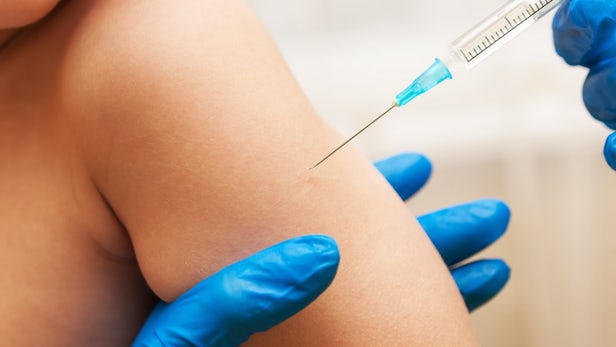
17th January 2019. The World Health Organisation (WHO) has listed the growing problem of ‘vaccine hesitancy’ as on of its 10 key threats to global health, alongside air pollution and drug resistant bacteria. According to the Centers for Disease Control and Prevention (CDCP) the number of young children not receiving some or all of their recommended vaccines is on the rise. 1.3 percent of the children born in 2015 in the US went without any recommended vaccinations, up from 0.9 percent in 2011 and 0.3 percent in 2001.
The WHO Vaccine Advisory Group list complacency, inconvenience in accessing vaccines and a lack of confidence as driving factors in vaccine hesitancy. A key aim in global AMR strategy is to increase vaccinations as a preventative measure. See article by Nick Lavars: World Health Organization lists "vaccine hesitancy" as a global health threat. To download full 2018 "Immunization Today and in the next Decade" click here
>A look back at a year of vaccine announcements
12 January 2019. Since Access to Medicine Foundation published the Access to Vaccines Index in March 2017, vaccine companies have reported a series of positive developments in their efforts to address immunisation coverage. The Access to Medicine Foundation has reviewed these statements to give a sense of the level of momentum in the vaccines industry to improve access to vaccines. Download the Overview of the companies public announcements.
The overview published today summarises announcements made by the eight companies evaluated in the Access to Vaccines Index. It includes announcements published between 1 April 2017 and 3 January 2018. Out of 18 published announcements, two thirds relate to research and development, with others relating to licensing agreements, procurement matters and vaccine supply. For more information visit CombatAMR's Special Feature page.
>NHS Long Term Plan
Published on 7 Jan 2019. https://www.longtermplan.nhs.uk/online-version Simon Stevens, Chief Executive summarises the contents of the plan at a launch at Alder Hey Children's Hospital with the Prime Minister, Theresa May.
The NHS Long Term Plan is a blueprint to ensure that in 10 years’ time we have a service fit for the future. As medicine advances, health needs change and society develops, so the NHS has to continually move forward. Drawn up by those who know the NHS best – frontline health and care staff, patients and their families and other experts – the Long Term Plan is ambitious but realistic.. To read the online version of the NHS Long Term Plan or Download the NHS Long Term Plan. NHS Long Term Plan: Overview and summary
>Second global call to action against drug-resistant infections - Accra, Ghana
19-20 November 2018. https://wellcome.ac.uk/news/second-global-call-action-against-drug-resistant-infections
The Wellcome Foundation has co-hosted a second global event, in Ghana, to help drive pioneering action to stop the rise and spread of superbugs.
The two-day Call to Action, which took place in Accra was co-hosted with the governments of Ghana and Thailand, and the United Nations Foundation, and organised in partnership with the Inter-Agency Coordination Group (IACG) on Antimicrobial Resistance. Health representatives from national governments and agencies, civil society, academia, the private sector and global philanthropies were invited to the Call to Action to focus on how to address the most critical gaps in tackling the development and spread of drug-resistant infections.
Key Take aways: 5 Ideas
- We all learn more from open and inclusive conversations. This year’s event had greater participation from the global south and wider antimicrobrial resistance (AMR) stakeholders.
- Emotions, not just facts, drive decision-making. If we want to inspire people to act in ways that can reduce AMR, we must rethink our tactics. Creative approaches such as comic books and dance can make a powerful impact.
- Civil society and the private sector are willing and able to do more. We now look to national and global leaders to engage them in the development of policies and strategies.
- Local successes must be identified, celebrated and nurtured. Pioneering grassroots projects are using innovative approaches to create big impacts on AMR. We need to develop better ways to identify these pioneers, and link them to National Action Plans and adding to the global pool of expertise.
- The UN Interagency Coordination Group will push AMR up the global agenda in 2019. The publication of their draft report at the beginning of next year will provide further opportunities for everyone working in the field to engage and push AMR up the global agenda.
>Is the solution to antibiotic resistance in SEWAGE? Bacteria-eating viruses have cured over a dozen Americans of superbugs - but the FDA has long dismissed it as 'Soviet pseudoscience'
Published 16 November 2018 by Natalie Rahhal, Deputy Health Editor for Daily Mail.
Superbugs, or antibiotic resistant bacteria, are a top concern among public health officials worldwide, but a handful of scientists may have found an unlikely solution: viruses culled from sewage, swamps and soil. These viruses aren’t like the ones that cause the common cold, Ebola or the flu. Bacteriophages, or phages, are unique viruses that don’t harm humans but - as their name literally means - they are ‘bacteria eaters.’
https://www.dailymail.co.uk/health/article-6390993/Bacteria-eating-viruses-cured-dozen-Americans-superbugs-rarely-used.html
>UN Environment Programme joins the Tripartite Partnership
12 November 2018 Bangkok, Thailand
The global tripartite partnership calling for more responsible use of antibiotics in humans, animals and agriculture (including aquaculture and plant production) has announced it is widening its coverage to include the environment sector.
The Food and Agriculture Organization of the United Nations (FAO), World Organisation for Animal Health (OIE), and World Health Organization (WHO) have expanded their partnership to counter antimicrobial resistance (AMR) through the addition of the United Nations Environment Programme (UN Environment). The move is intended to attack AMR in a more holistic way. The new partnership, which will be known as the Tripartite Plus, was announced today at the opening of the World Antibiotic Awareness Week (WAAW) observance in Asia and the Pacific.
read more http://www.fao.org/news/story/en/item/1169662/icode/
Former chief of WHO, Dr. Margaret Chan, when addressing the UN General Assembly said
“Consumers should make antibiotic-free meat their preferred choice.”
>EU approves major policy in battle against Superbugs - imposing antibiotic restrictions for use with livestock.
http://www.europarl.europa.eu/news/en/press-room/20181018IPR16526/meps-back-plans-to-halt-spread-of-drug-resistance-from-animals-to-humans
25 October 2018. With a 583-16 vote, the EU approved legislation that will limit prophylaxis use of antibiotics on various animal groups, impose restrictions on imports and enable European regulators to reserve certain drugs for human use only. The legislation will take effect in 2022. A separate measure also approved establishing new restrictions on the production and use of medicated animal feed supplies. The majority of microbial use is on livestock, often on healthy animals, kept in unhealthy conditions. To protect antibiotics and other microbials, a global resource for everyone, such practices have to cease.
Françoise Grossetête (EPP, FR), rapporteur, said: “This is a major step forward for public health. Beyond farmers or animal owners, the use of veterinary medicines concerns us all, because it has a direct impact on our environment and our food; in short, on our health. Thanks to this law, we will be able to reduce the consumption of antibiotics on livestock farms, an important source of resistance that is then transmitted to humans. Antibiotic resistance is a real sword of Damocles, threatening to send our health care system back to the Middle Ages.”
>UK seizes more than £2 million of fake medicines as part of international crackdown
24 October 2018. From: Medicines and Healthcare products Regulatory Agency

A crackdown on fake medicines and medical devices by the Medicines and Healthcare products Regulatory Agency (MHRA) has netted a haul of more than 1 million doses worth in excess of £2 million
The seizures were part of Interpol’s globally coordinated Operation Pangea initiative involving 116 countries.
Between 9-17 October the MHRA and UK partners found falsified and unlicensed medicines and medical devices in the UK including diazepam, modafinil and dermal fillers.
Read More
>Keep Antibiotics Working’ campaign re-launched
http://antibioticguardian.com/keep-antibiotics-working/
23.10.2018. The campaign educates the public about the risks of antibiotic resistance, urging people to always take the advice of healthcare professionals as to when they need antibiotics. The campaign also provides effective self-care advice to help individuals and their families feel better if they are not prescribed antibiotics. Watch the new campaign video!
"The UK has made great efforts in recent years to reduce prescribing rates of antibiotics, however, there continues to be a real need to preserve the drugs we have so that they remain effective for those who really need them and prevent infections emerging in the first place. This is not just an issue for doctors and nurses, the public have a huge role to play – today’s data and the launch of the national ‘Keep Antibiotics Working’ campaign must be a further wake-up call to us all."
Professor Dame Sally Davies, Chief Medical Officer for England.
 >G20-Argentine Presidency initiative: world leaders attending the Health Ministerial Meeting in Mar del Plata, Argentina, participated in a Public Health England led AMR crisis simulation exercise.
>G20-Argentine Presidency initiative: world leaders attending the Health Ministerial Meeting in Mar del Plata, Argentina, participated in a Public Health England led AMR crisis simulation exercise.
04.10.18. Argentina. G20 world leaders gathered in Argentina took part in a crisis simulation exercise led by England’s Chief Medical Officer Dame Sally Davies and developed and delivered by PHE, playing out what would happen in the event of an E.Coli antibiotic resistance epidemic. Simulation exercises help prepare for emergencies and increase our ability to keep people safe by testing out systems and processes. The exercise tested G20 world leaders on how they would tackle the spread of an E. Coli infection that is resistant to antibiotics and spreads across borders, putting public health, livestock, trade and travel at risk..
The simulation aimed to test leaders’ and countries’ ability to act quickly if antibiotic resistant bugs cross borders and lead to a pandemic affecting global public health, placing pressure on health systems and the economies of the fictional countries involved - and raise awareness and understanding of the key challenges of AMR - to encourage G20 ministers to ensure countries are doing everything they can in the global fight against superbugs.
A 2016 independent antimicrobial resistance review led by Lord O’Neill predicted that without urgent international action, AMR will cause the deaths of at least 10 million people a year by 2050. Antimicrobial resistance (AMR) is a natural phenomenon where microbes evolve to be able to resist the actions of drugs, making them ineffective.
Dame Sally Davies said “I am delighted to be co-facilitating this exercise with Dr Nelson Castro today, which will strengthen understanding of the risk of drug-resistant infections and allow world leaders to consider their response to this threat.”
Steve Brine, Public Health Minister said: “The UK is at the forefront of global action on AMR and while some progress has been made both at home and internationally, we cannot afford to lose ground. Superbugs do not recognise borders and our response must not be constrained by them either.”Tackling antibiotic resistance is a priority – we are committed to working with our neighbours overseas, including those at the G20 today, to coordinate a united response.”
Dr Nelson Castro is an Argentine journalist, doctor and writer. He hosts political debate show "El Juego Limpio" (English: Fair Game) on Todo Noticias (TN), Thursday nights.
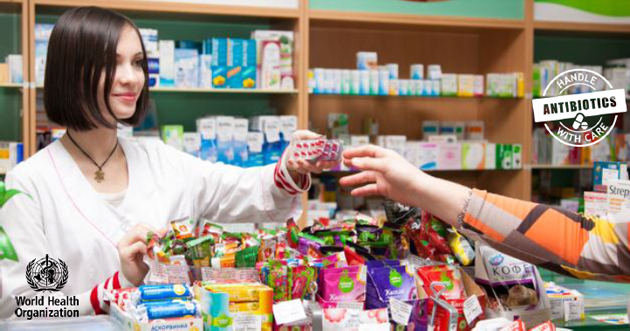
>The Second Consultation of Member States and Partners on the Global Development and Stewardship Framework to Combat Antimicrobial Resistance (AMR)
1-2 October 2018. NOTA BENE: (a) The tripartite of World Health Organization (WHO), Food and Agricultural Organization (FAO), and the World Organization for Animal Health (OIE) had become a quadripartite with the addition of United Nations (UN) Environment. (b) A chapter outlining propositions for an AMR treaty.2015 World Antibiotic Awareness Week postcard
The second informal consultation was held in accordance with the mandate to the Director-General to finalize, in consultation with Member States and relevant partners, a global development and stewardship framework. The framework aims to support the development, control, distribution and appropriate use of new antimicrobial medicines, diagnostic tools, vaccines and other interventions, while preserving existing antimicrobial medicines, and promoting affordable access to existing and new antimicrobial medicines and diagnostic tools, taking into account the needs of all countries, in line with the global action plan on antimicrobial resistance.
The outcome of the consultation will provide input for the finalization of the global framework by the Food and Agriculture Organization of the United Nations (FAO), the World Organisation for Animal Health (OIE) and WHO as per the United Nations high-level political declaration.

For more information on the meeting read the feedback from https://www.reactgroup.org/news-and-views/news-and-opinions/year-2018/intervention-at-the-member-state-consultation-on-the-global-framework-for-development-stewardship-to-combat-antimicrobial-resistance-part-1/
>Roadmap of the framework pdf,
http://www.who.int/antimicrobial-resistance/global-action-plan/UpdatedRoadmap-Global-Framework-for-Development-Stewardship-to-combatAMR_2017_11_03.pdf?ua=1
>Why we need a World Food Safety Day
http://www.fao.org/fao-who-codexalimentarius/news-and-events/news-detail...
17.09.2018. Sufficient amounts of safe and nutritious food is essential to human health but it is also important to acknowledge the strong links between food and health, since the World Health Organisation estimates that foodborne hazards are responsible for 600 million cases of foodborne diseases and 420,000 deaths globally every year. Having an international day will highlight the burden unsafe food places on health, communities and economies. It will provide an opportunity to underscore the fundamental role food safety has in achieving the Sustainable Development Goals (SDGs) and strengthen international efforts to ensure that the food we eat is safe.
“I encourage all Codex Members and Observers and anyone else who would like to participate in this campaign to bring world attention to the importance of food safety! We need food to live – safe food, and we have to care about keeping it safe”
Tom Heilandt, Codex Secretary
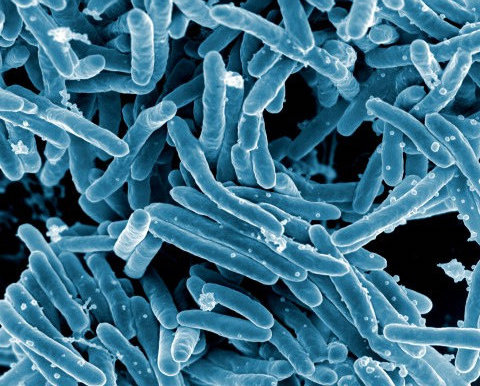
Mycobacterium tuberculosis bacteria
>NHS is hiding the true scale of deaths caused by drug-resistant infections out of fear the health service will look bad
04.09.18 Speaking to the UK Government's Health Select Committee, Dame Sally said that without antibiotics, modern medicine will be 'lost'. She called for a rule change to make sure it is routinely recorded on people's death certificates if they died of an antibiotic-resistant infection.
She said: 'That would really wake people up to the deaths as they happen,' 'One of the problems at the moment is families often don’t know that their bereavement was due to infection,' Dame Sally added. 'And they’re rarely told that the infection was resistant to treatment because it looks as if the NHS is failing.' The Telegraph read more.
 >Antimicrobial Resistance Inquiry
>Antimicrobial Resistance Inquiry
Health and Social Care Committee
WATCH UK Parliament TV 4 September 2018 Witnesses: Professor Dame Sally Davies, Chief Medical Officer for England, Lord O'Neill of Gatley, Christine Middlemiss, Chief Veterinary Officer, Government Veterinary Services.
Penicillin heralded the dawn of the antibiotic age - due to overuse and misuse we are approaching a post-antibiotic age.